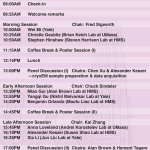I would like to invite you to a one day conference on Imaging Mass Spectrometry and Omics Symposium that will be held at YSPH tomorrow on November 22, 2019. The flyer is attached.
Tissue Imaging Flyer2019_v3[1].pdf
Tag Archives: seminars
Statseminars S&DS Talk, Speaker: Weijie Su, 10/28, “Gaussian Differential Privacy”, DL220
MONDAY, OCTOBER 28, 2019
Department of Statistics and Data Science
Weijie Su, University of Pennsylvania, Wharton School
Monday, October 28, 2019
4:00PM to 5:15PM
Dunham Lab. see map
10 Hillhouse Avenue, 2nd Floor, Room 220
New Haven, https://statistics.yale.edu/seminars/weijie-su-0
Title: Gaussian Differential Privacy
Information and Abstract: Privacy-preserving data analysis has been put on a firm mathematical foundation since the introduction of differential privacy (DP) in 2006, with its deployment on iOS and Chrome lately. This privacy definition, however, has some well-known weaknesses: notably, it does not tightly handle composition. This weakness has inspired several recent relaxations of differential privacy based on Renyi divergences. We propose an alternative relaxation of differential privacy, which we term “f-DP”, which has a number of nice properties and avoids some of the difficulties associated with divergence based relaxations. First, it preserves the hypothesis testing interpretation of differential privacy, which makes its guarantees easily interpretable. It allows for lossless reasoning about composition and post-processing, and notably, a direct way to analyze privacy amplification by subsampling. We define a canonical single-parameter family of definitions within our class that is termed “Gaussian Differential Privacy”, based on hypothesis testing of two shifted normal distributions. We prove that this family is focal to f-DP by introducing a central limit theorem, which shows that the privacy guarantees of any hypothesis-testing based definition of privacy (including differential privacy) converge to Gaussian differential privacy in the limit under composition. This central limit theorem also gives a tractable analysis tool. We demonstrate the use of the tools we develop by giving an improved analysis of the privacy guarantees of noisy stochastic gradient descent.
This is joint work with Jinshuo Dong and Aaron Roth.
3:45 p.m. Pre-talk tea Dunham Lab, Suite 222, Breakroom 228
For more details and upcoming events visit our website at
http://statistics.yale.edu/ .
YINS Today@1pm: Crash Course on GANs with Mario Lucic (Google Brain)
for those interested, let’s walk from bass around 12:30p
YINS Tomorrow@12: Robust Learning with Applications to Health Analytics
“Distributionally Robust Learning with Applications to Health Analytics”
Speaker: Yannis Paschalidis
Boston University
http://sites.bu.edu/paschalidis/ (link is external)
Wednesday, April 17, 2019 – 12:00pm
Yale Institute for Network Science, 17 Hillhouse Avenue, 3rd floor Abstract: We will present a distributionally robust optimization approach to learning predictive models, using general loss functions that can be used either in the context of classification or
regression. Motivated by medical applications, we assume that training data are contaminated with (unknown) outliers. The learning problem is formulated as the problem of minimizing the worst case expected loss over a family of distributions within a certain Wasserstein ball centered at the empirical distribution obtained from the training data. We will explore the generality of this approach, its robustness properties, its ability to explain a host of “ad-hoc” regularized learning methods, and we will establish rigorous out-of-sample performance guarantees.
Beyond predictions, we will discuss methods that can leverage the robust predictive models to make decisions and offer specific personalized prescriptions and recommendations to improve future outcomes. We will provide some examples of medical applications of our methods, including predicting hospitalizations for chronic disease patients, predicting hospital length-of-stay for surgical patients, and making treatment recommendations for diabetes and hypertension. Speaker Bio: Yannis Paschalidis is a Professor and Data Science Fellow in Electrical and Computer Engineering, Systems Engineering, and Biomedical Engineering at Boston University. He is the Director of the Center for Information and Systems Engineering (CISE). He obtained a Diploma (1991) from the National Technical University of Athens, Greece, and an M.S. (1993) and a Ph.D. (1996) from the Massachusetts Institute of Technology (MIT), all in Electrical Engineering and Computer Science. He has been at Boston University since 1996. His current research interests lie in the fields of systems and control, networks, optimization, operations research, computational biology, and medical informatics.
Prof. Paschalidis’ work has been recognized with a CAREER award (2000) from the National Science Foundation, the second prize in the 1997 George E. Nicholson paper competition by INFORMS, the best student paper award at the 9th Intl. Symposium of Modeling and Optimization in Mobile, Ad Hoc, and Wireless Networks (WiOpt 2011) won by one of his Ph.D. students for a joint paper, an IBM/IEEE Smarter Planet Challenge Award, and a finalist best paper award at the IEEE International Conference on Robotics and Automation (ICRA). His work on protein docking (with his collaborators) has been recognized for best performance in modeling selected protein-protein complexes against 64 other predictor groups (2009 Protein Interaction Evaluation Meeting). His recent work on health informatics won an IEEE Computer Society Crowd Sourcing Prize. He was an invited participant at the 2002 Frontiers of Engineering Symposium organized by the National Academy of Engineering, and at the 2014 National Academies Keck Futures Initiative (NAFKI) Conference. Prof. Paschalidis is a Fellow of the IEEE and the founding Editor-in-Chief of the IEEE Transactions on Control of Network Systems.
Mbbfacultyall Save the Date! The 3rd New England CryoEM Mtg, 3/31/2019
YINS 4/10: John Tsitsiklis, “Safeguarding Privacy in Sequential Decision-Making Problems”
YINS Distinguished Lecturer Series
“Safeguarding Privacy in Sequential Decision-Making Problems”
Speaker: John Tsitsiklis
Clarence J. Lebel Professor of Electrical Engineering and Computer Science at MIT
Wednesday, April 10, 2019 – 12:00pm
Yale Institute for Network Science | 17 Hillhouse Avenue, 3rd floor | New Haven, CT 06511
Abstract: With the increasing ubiquity of large-scale surveillance and data analysis infrastructures, privacy has become a pressing concern in many domains. We propose a framework for studying a fundamental cost vs. privacy tradeoff in dynamic decision-making problems. More concretely, we are interested in ways that an agent can take actions that make progress towards a certain goal, while minimizing the information revealed to a powerful adversary who monitors these actions. We will examine two well-known decision problems (path planning and active learning), and in both cases establish sharp tradeoffs between obfuscation effort and level of privacy. As a byproduct, our analysis also leads to simple yet provably optimal obfuscation strategies. Based on joint work with Kuang Xu (Stanford) and Zhi Xu (MIT).
Speaker bio: John Tsitsiklis is the Clarence J. Lebel Professor of Electrical Engineering and Computer Science at MIT, and a member of the National Academy of Engineering. He obtained his PhD from MIT and joined the faculty in 1984. His research focuses on the analysis and control of stochastic systems, including applications in various domains, from computer networks to finance. He has been teaching probability for over 15 years.
Virus & Other Infectious-Associated Cancers Retreat
Amy Justice and Walther Mothes; program leaders of the VOIC Research Program, invite you to the Virus & Other Infection-associated Cancer Program Retreat being held on Tuesday, April 30, 2019 in Hope H216.
Attached is agenda and flyer for the event. SPACE IS LIMITED.
Please contact Susan Silva ([email protected]) with any questions.
Secondary_appt Department-cs FW: Joint Biostatistics, CS, and S&DS Talk, Bin Yu, 4/1, “Three principles of data science: predictability, computability, and stability “, DL 220
Joint Biostatistics, CS, and S&DS
BIN YU, University of California, Berkeley
Date: Monday, April 01, 2019
Time: 4:00PM to 5:15PM
Dunham Lab. see map
10 Hillhouse Avenue, Rm. 220
New Haven, CT 06511
Website
Title: Three principles of data science: predictability,
computability, and stability (PCS)
Information and Abstract:
In this talk, I’d like to discuss the intertwining importance and connections of three principles of data science in the title and the PCS workflow that is built on the three principles. The principles will be demonstrated in the context of two collaborative projects in neuroscience and genomics for interpretable data results and testable hypothesis generation. If time allows, I will present proposed PCS inference that includes perturbation intervals and PCS hypothesis testing. The PCS inference uses prediction screening and takes into account both data and model perturbations. Finally, a PCS
documentation is proposed based on Rmarkdown, iPython, or Jupyter Notebook, with publicly available, reproducible codes and narratives to back up human choices made throughout an analysis. The PCS workflow and documentation are demonstrated in a genomics case study available on Zenodo.
3:45 p.m. Pre-talk tea Dunham Lab, Suite 222, Breakroom 228
For more details and upcoming events visit our website at
http://statistics.yale.edu/ .
MB&B Seminar: “Proton-Coupled Electron Transfer in Enzymes and Photoreceptor Proteins”
|
|||||||||||||||||||||||
|
|
Message to Yale Community about 2018 Day of Data – small correction
You are invited to attend the 6th annual Yale Day of Data on November 30 in Sterling Memorial Library.
The Yale Day of Data brings together researchers and data experts from across the disciplines to share experiences, challenges, and best practices related to data-intensive research. If you collect, manage, analyze, interpret, or otherwise work with data, this event is for you.
This year’s theme, “Data on Earth,” is intentionally broad, to encompass data about the Earth and the environment, data that help us understand the health and lives of Earth’s inhabitants, and data with global impact.
Keynote: William Michener (Principal Investigator of DataONE, Professor and Director of e-Science Initiatives, University Libraries, University of New Mexico), “Managing Data Throughout the Research Life Cycle to Enable New Science and Support Decision Making”
Talks by Yale faculty and researchers: Tracey Meares, Dena
Schulman-Green, Karen Seto, Alan Gerber, Jessi Cisewski, Casey King, Martin Wainstein & Sophie Janaskie
Registration is now open for the 2018 Yale Day of
Data:https://elischolar.library.yale.edu/dayofdata/2018/.

